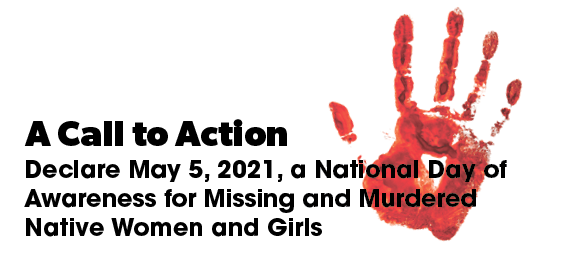A Call to Action for May 5th National Day of Awareness for MMIWG

In 2017, the Montana Congressional Delegation led the way for the passage of a Senate resolution declaring May 5th the National Day of Awareness for Missing and Murdered Native Women and Girls (MMIW) in response to the demands for justice following the disappearance and murder of Hanna Harris at the Northern Cheyenne Reservation in 2013.
Since May 5th, 2017, Native women continue to be murdered and go missing. In response, their families and communities across Indian Country, Alaska, and Hawaii are calling for justice and reforms to change the systemic barriers to the safety of Native women.
Turning our grief into action, we call upon Congress to address the foundational reforms required to address MMIW beyond individual cases. The crisis of MMIWG is the culmination of a spectrum of violence perpetrated against Native women. It reflects the intersection of domestic violence, sexual assault, trafficking, and other crimes committed against Native women. These crimes occur due to a long history of government policies, programs, and laws that cause Native women to be vulnerable to such crimes.
The issues surrounding missing and murdered Native women must continue to be brought into the public’s awareness to increase accountability of social, political, economic, and government systems and responses.
A National Day of Awareness for Missing and Murdered Native Women and Girls provides a process for public healing and accountability for this crisis, and honoring those who have been abducted, gone missing, or been murdered. It is essential on the broadest level to acknowledge the historic and ongoing human suffering and death that U.S. colonization has ravaged upon Native women.
We call on all those concerned for the safety of Native women to organize at the local, tribal, state, national, and international levels to support the 2021 National Day of Awareness for Missing and Murdered Native Women and Girls calling for systemic change.
Join us to tell Congress enough is enough.
Lucy Simpson (Diné), Executive Director, National Indigenous Women’s Resource Center
Juana Majel Dixon (Pauma Band of Luiseno Mission Indians) & Shannon Holsey (Stockbridge-Munsee Community Band of Mohican Indians), Co-Chairs, NCAI Task Force on Violence Against Women
Robert T. Coulter (Potawatomi), Executive Director, Indian Law Resource Center
Tami Truett Jerue (Anvik Tribe), Executive Director, Alaska Native Women’s Resource Center
Rosemond Keanuenue Pettigrew (Native Hawaiian), President, Board of Directors, Pouhana O Na Wahine
Dawn Stover (Cherokee), Executive Director, Alliance of Tribal Coalitions to End Violence





